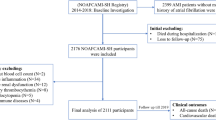Abstract
Introduction
This investigation aimed to evaluate the predictive value of the systemic immune-inflammation index (SII) for in-hospital and long-term mortality in elderly patients with non-ST-elevation myocardial infarction (NSTEMI).
Methods
This retrospective investigation included 314 consecutive elderly NSTEMI patients in a tertiary center. SII is computed as (neutrophils × platelets)/lymphocytes. Based on the increased SII values, we classified the research sample into three tertile groups as T1, T2, and T3. The in-hospital and long-term mortality were defined as the primary outcomes.
Results
Patients in the T3 group had lower chances of survival in the in-hospital and long-term periods compared with those in the T2 and T1 groups. According to the multivariable Cox regression models, SII independently related with in-hospital (hazard ratio (HR): 1.001, 95% CI: 1.000–1.1003, p = 0.038) and long-term mortality (HR: 1.004, 95% CI: 1.002–1.006, p < 0.001). To predict long-term mortality, the optimal SII value was > 2174 with 80% sensitivity and 85.4% specificity. SII had a slightly lower but statistically non-inferior discriminative ability for long-term mortality compared with the Charlson comorbidity index (CCI) in the receiver operating characteristic curve comparison (AUC: 86.2 vs. AUC: 890, p > 0.05). Additionally, combining SII with traditional risk factors and the CCI revealed a significant improvement in C-statistics.
Conclusion
This investigation may be the first to demonstrate that SII is independently linked with in-hospital and long-term mortality in elderly NSTEMI patients.




Similar content being viewed by others
References
Taglieri N, Saia F, Bacchi Reggiani ML et al (2018) Prognostic significance of shockable and non-shockable cardiac arrest in ST-segment elevation myocardial infarction patients undergoing primary angioplasty. Resuscitation 123:8–14
Lüscher TF (2016) The management of acute coronary syndromes: towards optimal treatment of STEMI and non-STEMI. Eur Heart J 37:203–205
García-Blas S, Cordero A, Diez-Villanueva P et al (2021) Acute coronary syndrome in the older patient. J Clin Med 10:4132
Gul I, Zungur M, Aykan AC et al (2016) The relationship between GRACE score and epicardial fat thickness in non-STEMI patients. Arq Bras Cardiol 106:194–200
Hammami R, Jdidi J, Mroua F et al (2018) Accuracy of the TIMI and GRACE scores in predicting coronary disease in patients with non-ST-elevation acute coronary syndrome. Rev Port Cardiol (Engl Ed) 37:41–49
Damen SAJ, Cramer GE, Dieker HJ et al (2018) A multi-site coronary sampling study on CRP in non-STEMI: novel insights into the inflammatory process in acute coronary syndromes. Atherosclerosis 278:117–123
Yüksel M, Yıldız A, Oylumlu M et al (2015) The association between platelet/lymphocyte ratio and coronary artery disease severity. Anatol J Cardiol 15:640–647
Ateş AH, Aytemir K, Koçyiğit D et al (2016) Association of neutrophil-to-lymphocyte ratio with the severity and morphology of coronary atherosclerotic plaques detected by multidetector computerized tomography. Acta Cardiol Sin 32:676–683
Yang YL, Wu CH, Hsu PF et al (2020) Systemic immune-inflammation index (SII) predicted clinical outcome in patients with coronary artery disease. Eur J Clin Invest 50:e13230
Hu B, Yang XR, Xu Y et al (2014) Systemic immune-inflammation index predicts prognosis of patients after curative resection for hepatocellular carcinoma. Clin Cancer Res 20:6212–6222
Tosu AR, Kalyoncuoglu M, Biter Hİ et al (2021) Prognostic value of systemic immune-inflammation index for major adverse cardiac events and mortality in severe aortic stenosis patients after TAVI. Medicina 57:588
Kelesoglu S, Yilmaz Y, Elcık D et al (2021) Systemic immune inflammation index: a novel predictor of contrast-induced nephropathy in patients with non-ST segment elevation myocardial infarction. Angiology 72:889–895
Yang T, Chen J, Liu X et al (2020) Non-ST-elevated myocardial infarction with “N” wave on electrocardiogram and culprit vessel in left circumflex has a risk equivalent to ST-elevated myocardial infarction. Clin Cardiol 43:491–499
Cammalleri V, Bonanni M, Bueti FM et al (2021) Multidimensional Prognostic Index (MPI) in elderly patients with acute myocardial infarction. Aging Clin Exp Res 33:1875–1883
Roe MT, Chen AY, Thomas L et al (2011) Predicting long-term mortality in older patients after non-ST-segment elevation myocardial infarction: the CRUSADE long-term mortality model and risk score. Am Heart J 162:875-883.e1
Döring Y, Soehnlein O, Weber C (2017) Neutrophil extracellular traps in atherosclerosis and atherothrombosis. Circ Res 120:736–743
Pasalic L, Wang SS, Chen VM (2016) Platelets as biomarkers of coronary artery disease. Semin Thromb Hemost 42:223–233
Yang R, Chang Q, Meng X et al (2018) Prognostic value of Systemic immune-inflammation index in cancer: a meta-analysis. J Cancer 9:3295–3302
Fang H, Zhang H, Wang Z et al (2020) Systemic immune-inflammation index acts as a novel diagnostic biomarker for postmenopausal osteoporosis and could predict the risk of osteoporotic fracture. J Clin Lab Anal 34:e23016
Rimini M, Casadei-Gardini A, Ravaioli A et al (2020) Could inflammatory indices and metabolic syndrome predict the risk of cancer development? Analysis from the Bagnacavallo population study. J Clin Med 9:1177
Liu Y, Ye T, Chen L et al (2021) Systemic immune-inflammation index predicts the severity of coronary stenosis in patients with coronary heart disease. Coron Artery Dis 32:715–720
Tang Y, Zeng X, Feng Y et al (2021) Association of systemic immune-inflammation index with short-term mortality of congestive heart failure: a retrospective cohort study. Front Cardiovasc Med 8:753133
Sanchis J, Núñez E, Barrabés JA et al (2016) Randomized comparison between the invasive and conservative strategies in comorbid elderly patients with non-ST elevation myocardial infarction. Eur J Intern Med 35:89–94
Hautamäki M, Lyytikäinen LP, Mahdiani S et al (2020) The association between Charlson comorbidity index and mortality in acute coronary syndrome—the MADDEC study. Scand Cardiovasc J 54:146–152
Franceschi C, Bonafè M, Valensin S et al (2000) Inflamm-aging. An evolutionary perspective on immunosenescence. Ann NY Acad Sci 908:244–254
Franceschi C, Capri M, Monti D et al (2007) Inflammaging and anti-inflammaging: a systemic perspective on aging and longevity emerged from studies in humans. Mech Ageing Dev 128:92–105
Ferrucci L, Fabbri E (2018) Inflammageing: chronic inflammation in ageing, cardiovascular disease, and frailty. Nat Rev Cardiol 15:505–522
Morrisette-Thomas V, Cohen AA, Fülöp T et al (2014) Inflamm-aging does not simply reflect increases in pro-inflammatory markers. Mech Ageing Dev 139:49–57
Funding
The authors have no funding to disclose.
Author information
Authors and Affiliations
Corresponding author
Ethics declarations
Conflict of interest
The authors have no conflict of interest regarding to publishing this article.
Ethical approval
All procedures performed in studies involving human participants were in accordance with the ethical standards of the institutional research committee and with the 1964 Helsinki declaration and its later amendments or comparable ethical standards. The design of the study was approved by the Local Ethics Committee (Decision number: 2021/23).
Research involving human and animal participants
This article does not contain any studies with animals performed by any of the authors.
Informed consent
Informed consent was not needed to due the retrospective design of the study.
Consent to participate
Not applicable. The study had a retrospective design.
Consent to publication
All authors gave explicit consent to submit and publish the article.
Additional information
Publisher's Note
Springer Nature remains neutral with regard to jurisdictional claims in published maps and institutional affiliations.
Rights and permissions
About this article
Cite this article
Orhan, A.L., Şaylık, F., Çiçek, V. et al. Evaluating the systemic immune-inflammation index for in-hospital and long-term mortality in elderly non-ST-elevation myocardial infarction patients. Aging Clin Exp Res 34, 1687–1695 (2022). https://doi.org/10.1007/s40520-022-02103-1
Received:
Accepted:
Published:
Issue Date:
DOI: https://doi.org/10.1007/s40520-022-02103-1




